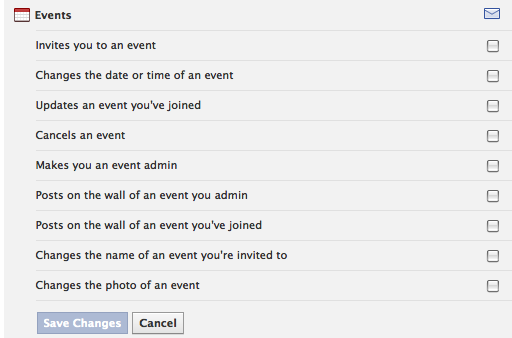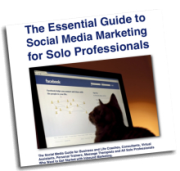 Post by Julia Stewart, MCC.
Post by Julia Stewart, MCC.
Okay, life coaches, including me, don't usually call people, 'Losers.' I admit, I said it to be provocative. My apologies. I'm having a little fun. But if you use Facebook Events to market your coaching business, you're losing. It's that simple.
You're losing fans, friends, credibility and even interest in your events. And that's no fun.
Let me explain. As we all know, Facebook is approaching the Big B: one billion users. That means soon, one in every seven people will be on Facebook. So that makes it the perfect place to advertise your events, yes? Probably not.
Anyone with a Facebook account can create a Facebook Event and invite all their Facebook Friends to it via email. They can also send frequent email updates to everyone who has been invited, even if nobody has agreed to come to the event.
This is a nice little tool if you're planning a school fund raiser. The trouble is that SPAMMERS, those folks we've all hated since long before international laws were passed to make SPAM a criminal offense, think Facebook Events is a nifty tool, too. After all, it's not illegal, yet.
And unfortunately, less savvy marketers also use Facebook Events and when you do, the folks who used to be your Facebook Friends start thinking of you as one of those SPAMMERS.
Yes, there you are, sharing space in their minds right along side the guy from Russia who wants to sell them penis-enlargement pills, cheap Viagra and fake Rolex watches. Or the prince from Nigeria who constantly needs help cashing a check.
Do you really want your coaching business to be regarded that way?
No doubt, some well-meaning social-media 'guru', or 'coach', or virtual assistant told you about this slick little tool that lets you SPAM...er email, all your friends on Facebook for free whenever you have an event to announce ~ or even when you don't (Some really un-slick marketers use Facebook Events to SPAM their Friends any ol' time).
An important rule of thumb in marketing, especially with social-media: Just because you can, doesn't mean you should.
So far, using Facebook Events is legal, so you can. And Facebook, not exactly a paragon of privacy, puts the onus of removing oneself from an Event list on the recipient, not the sender. So you're technically not doing anything wrong by inviting all your Friends, even if you know they won't be interested or they are too far away to attend.
However, in the rest of the Universe that is not already controlled by Facebook, people know they have a right to avoid SPAM and they usually have the ability to choose which messages reach them via email. So it makes them incredibly mad when you violate that.
This is a complete reverse of the marketing world 20 years ago, when advertisers could shoot their messages at potential customers via TV, junk mail, etc. just as if we were sitting ducks. Nobody likes being a sitting duck. And we don't like being reminded what it's like.
By using Facebook Events, you're using 2012 social media to market like it's 1992.
So how are you losing? Let me count the ways:
- People don't hire coaches they don't trust and nobody trusts a SPAMMER.
- Your RSVP list on your Event Page will look something like: 'Yes: 2, Maybe: 5, Un-responded: 993', which makes your event look like the party nobody wants to attend.
- Lucky for you, those 'Un-responded' numbers include all the 'No's', because Facebook doesn't publish those. What's not so lucky for you is that when your annoyed Friends go to the trouble of visiting your Event Page to decline your invitation and thus turn off the irritating messages they're getting from you, Facebook gives them the instant opportunity to check a box to ignore all future communications from you, or block you completely, un-friend you, or report you to Facebook for SPAM; all with a simple click and yes, some folks get mad enough to do all that.
- Your constant email 'updates' about the Event may be so irksome that even the people who thought they might attend may very well change their minds.
- You're now associated with the penis-enlargement guy.
- Increasingly, nobody pays attention to Facebook Events, so you might as well announce your event via telegraph.
- And you're still associated with that guy.
For anyone who would like to know how to stop getting invitations to Facebook Events, here are a couple or routes. Sign in to Facebook and click the little downward arrow in the upper right corner (I know, it's really tiny.) Then choose Privacy Settings, then Manage Blocking. You can write in the names of people you want to block from Event Invites. See below:

But an easier way to block all events before they reach your inbox is to go to Account Settings, choose Notifications, then Events and un-click everything:

Are you tempted to keep receiving invites in case that really cool life coach that you love wants to invite you to something? Don't be. If they are that cool, they already don't use Facebook Events. And if you really love them, you probably are already on their mailing list, which means they will be emailing you directly.
And if you're a life coach who is tempted to market with Facebook Events, just don't. There are so many better ways to connect online in ways that people welcome, that you never need to annoy them or look like a loser, by using Facebook Events.
If you're new to social media marketing or just want to brush up:









 by
by 



 Post by
Post by




 Guest post by
Guest post by 
 The number one question that business and life coaches ask me over and over and over is, '
The number one question that business and life coaches ask me over and over and over is, '

